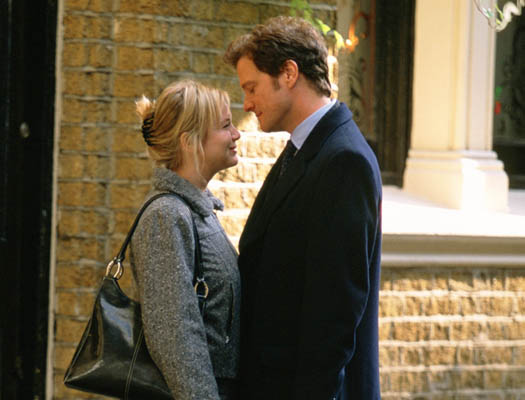|
John Mullan on Bridget Jones
Guardian Book Club
John Mullan | The Guardian - November 27, 2013

Bridget deserves her Mr Darcy…
Renée Zellwegger and Colin Firth in Bridget Jones: The Edge of Reason PR
We know Bridget Jones’s Diary is based on Pride
and Prejudice, and Bridget half knows it, too. She latches on
to the comedy of handsome, aloof Mark Darcy sharing a
name with Jane
Austen’s
paragon of pride. When she first encounters him, at Una and
Geoffrey Alconbury’s New Year’s Day turkey curry buffet, she notes
the parallel. Instead of mingling happily, he stands with his back to
the room, scrutinising the Alconburys’ bookshelves: “It struck me as
pretty ridiculous to be called Mr Darcy and to stand on your own
looking snooty at a party.” As bad, she thinks, as being called
Heathcliff and spending your evening in the garden “shouting
‘Cathy’ and banging your head against a tree”. Naturally, the
distant Mark Darcy is unconscious of his similarity to his famous
progenitor, even as he falls into his patterns of behaviour.
Mark Darcy is as dauntingly handsome and rich as his Regency
counterpart. Fresh from her discovery of “boyfriend” Daniel
Cleaver’s sexual perfidy, Bridget tries to read herself to sleep
with Tatler and finds Mark Darcy’s visage “smouldering out from a
feature on London’s 50 most eligible bachelors”. She ponders the
parallel, having a long telephone conversation with her friend Jude
“about the comparative merits of Mr Darcy and Mark Darcy”; they
agree that Austen’s leading man – being “ruder” – is even more
attractive. Of course, the point (which Bridget does not get) is that
she is following the Austen plot, too: the man you think you cannot
stand is the one who is destined for you. And willowy top lawyer
Natasha, who looks like the modern Darcy’s natural partner, is but a
latter-day Caroline Bingley. Her bitchy put-downs of her perceived rival
(“Not in your bunny girl outfit today, then?”), like Miss
Bingley’s of Elizabeth (“Her hair, so untidy, so blowsy!”), have
the opposite of their intended effect.
We recognise all this because we know where the story comes from. And so
we know roughly where it must go. The essential sexual geometry is taken
from Austen’s novel: the woman is drawn to the conversationally adept
charmer (Wickham/Daniel), but has to learn that he is a cad, and
discover instead the deeper virtues of his foe. And they are foes:
Wickham tried to seduce Mr Darcy’s sister; Daniel slept with
Mark Darcy’s wife. When Mark Darcy steps in to avert family
catastrophe (Austen’s eloping Lydia is replaced by Bridget’s eloping
mother – in the company of Julio, the Portuguese conman who has
tricked her parents’ friends out of their savings), he is heading for
roughly the same reward as Austen’s Mr Darcy.
Bridget’s posh colleague Perpetua loudly laments that “a whole
generation” only gets to know Austen, Eliot and Dickens through
television, but Bridget (BA in Eng Lit, University of Bangor) has surely
read the books, too. When told that Bridget finds Blind Date as
absorbing as Othello, Mark Darcy reflects that she is
“clearly a top post-modernist”. Like a top postmodernist, she weaves fiction into
her life. “Just nipped out for fags prior to getting changed ready for
BBC Pride and Prejudice,” she records. Mr Darcy and Elizabeth
are, she confesses, her “chosen representatives”. In Bridget
Jones: The Edge of Reason our heroine discusses her problems
with men as her friend Sharon “fiddled with the Pride and
Prejudice video to try to find the bit where Colin Firth dives
into the lake”. They fall silent before the apparition of
“Colin Firth emerging from the lake dripping wet”. Like a good
postmodernist, the narrator makes the casting of Firth as Mark Darcy in
the Bridget Jones film adaptation inevitable.
In this Bridget Jones book the template is not Pride and
Prejudice but Persuasion, Austen’s last completed
novel. Bridget is persuaded (self-help books and friends’ advice) to
fend off Mark Darcy. When she is later horrified to hear from Admiral
Darcy that his son is getting married – only to have her heart
restarted by learning that this is “our other son” Peter – we
are replaying the moment in Persuasion when Anne Elliot
is told by Mrs Croft that her brother is getting married – and assumes
for a terrible moment that she means Frederick, the man she loves. When,
hidden behind a hedge, Bridget listens to Mark Darcy complimenting the
alluring Rebecca on her strength of purpose for saying she will
always “follow my heart”, we are back with Austen’s Anne
overhearing Captain Wentworth similarly complimenting the foolish,
pretty Louisa Musgrove. As there is a depressive character called
Giles Benwick in attendance, we know that he must be Rebecca’s
destined partner, just as Captain Benwick is selected for Louisa in Persuasion.
But Bridget deserves her Mr Darcy. What Fielding most cunningly swipes
from Austen is the idea that the proud, superior man whom every girl
would like to nab is only interested in the young woman who fails to
flatter him. “Bridget, all the other girls I know are so lacquered
over,” says MD, plaintively. The very thing that makes the reader love
her – the range of her incompetence – makes him love her, too.
|